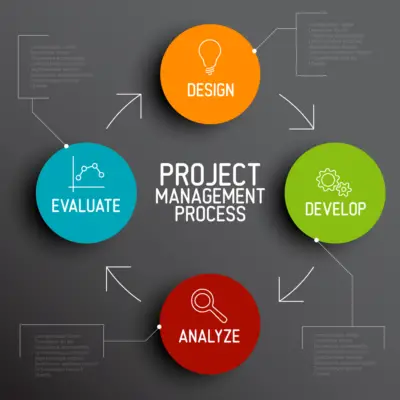Special Project Administrators are crucial in organizing and managing projects exceeding regular job responsibilities. They skillfully coordinate tasks, align project scopes with budgets, and lead teams to meet deadlines successfully.
Strong leadership, organizational prowess, and staff management are essential to project accomplishment. Essential qualifications often encompass a Bachelor’s degree in business or relevant fields, coupled with industry experience and critical thinking.

Advancing with an MBA or IFMA accreditation can enhance career opportunities. Efficiency in project administration, business management, and key human being skills like project management techniques and communication is critical to save job and job type.
Understanding their role is just the beginning of comprehending the depth of their contributions.
Key Takeaways
- Strong leadership and organizational skills are essential.
- Bachelor’s degree in business or related field is typically required.
- Pursuing an MBA or IFMA accreditation enhances career prospects.
- Focus on project administration, business management, and project management techniques.
- Education, experience, and certifications are vital for success.
Understanding the Role of a Project Administrator
A project administrator plays a vital role in overseeing, managing, and executing projects efficiently. They are responsible for ensuring that projects align with set budgets and timelines, requiring strong organizational and leadership skills.
This role demands attention to detail, effective communication, and the ability to adapt to changing project needs.
Definition and Overview
Special project administrators play a pivotal role in organizing, leading, and executing projects that extend beyond standard job responsibilities.
They coordinate project tasks, ensuring smooth execution. Leadership skills are essential for guiding project teams effectively. Aligning project scope with the budget is vital for success. Staff management plays a key role in meeting project timelines.
These professionals require industry experience and strong organizational skills. A bachelor’s degree in business or a related field is typically necessary, with an MBA being advantageous for career growth. Accreditation from organizations like IFMA can also boost job opportunities in this field.
Developing the Necessary Skills and Qualifications
To excel as a special project administrator, individuals must possess the knowledge and strong leadership and organizational skills essential for managing projects effectively.
Typically, candidates should have several years of industry experience and a bachelor’s degree in business or a related field to qualify for such roles.
Pursuing additional education, like obtaining an MBA or seeking accreditation from organizations such as IFMA, can further enhance one’s career prospects in this specialized field.
Business Administration and Management Principles
Developing strong leadership and organizational skills, along with gaining relevant industry experience and obtaining or completing a Bachelor’s degree in business or a related field, are essential steps towards becoming a successful Special Project Administrator.
To excel in this role, individuals should focus on honing their abilities in project administration, business administration, and management skills.
Here are four key areas to prioritize:
- Mastering project management techniques
- Enhancing budget management capabilities
- Improving timelines and deadline management
- Strengthening communication and coordination skills
Education and Certification Requirements
Candidates pursuing a career as a Special Project Administrator typically need to possess a Bachelor’s degree in business or a closely related field.
While an MBA is desirable for career advancement, accreditation from the International Facility Management Association (IFMA) can also enhance job prospects in this field. Several years of industry experience are usually necessary to excel in the role of a Special Project Administrator.
Key qualifications for this position include strong leadership, organizational skills, problem-solving abilities, and effective communication.
These skills are essential for overseeing and executing projects efficiently, ensuring that timelines and budgets are met.
Aspiring Special Project Administrators should focus on developing these competencies through education, industry experience, and relevant certifications to thrive in this role.
Mastering Project Administration Tasks
Effective project administration tasks encompass various important aspects. These include project planning and coordination, financial analysis, and budgeting. Project administrators play a pivotal role in structuring projects, managing resources, and ensuring that financial goals align with project outcomes.
Mastering these tasks requires a keen eye for detail, strategic thinking, and the ability to adapt swiftly to changing project dynamics.
Project Planning and Coordination
With a focus on meticulous organization and strategic oversight, project planning and coordination serve as foundational pillars within the domain of mastering project administration tasks.
- Defining project scope, objectives, and deliverables guides the project team.
- Scheduling tasks, allocating resources, and monitoring progress guarantees project milestones are met.
- Creating and updating project documentation, such as schedules and risk analyses, is vital.
- Effective project planning and coordination are essential for successful project execution and achieving desired outcomes.
Financial Analysis and Budgeting
Special project administrators exhibit proficiency in financial analysis and budgeting to guarantee the successful management of project finances. They analyze project costs, track expenses, and make sure projects adhere to budget constraints.
These administrators play an important role in financial planning, forecasting, and monitoring project expenditures.
Collaboration with project managers is necessary to develop accurate project budgets and financial reports. Proficiency in financial analysis tools and budgeting software is essential for special project administrators to communicate effectively and manage project finances.
Ensuring Project Quality and Verification
Project quality and verification are essential components of successful project management. Verification guarantees that project deliverables meet required criteria and gain stakeholder approval.
Quality control measures are implemented to prevent errors and defects in project outcomes, ultimately contributing to timely and budget-conscious project completion.
Verification Successful Waiting
Ensuring project quality through successful verification is a pivotal step in the project management process, validating adherence to established standards, procedures and requirements.
Waiting for verification signifies a crucial review phase where stakeholders review and confirm that project deliverables align with project objectives.

Successful verification indicates thorough evaluation and approval for proceeding to the next phase or project completion. This step is essential for maintaining project quality, stakeholder satisfaction, and overall project success.
- Stakeholders review and confirm alignment with project objectives.
- Thorough evaluation is conducted during successful verification.
- Approval for the next phase or project completion is granted.
- Project quality, stakeholder satisfaction, and overall project success are maintained.
Effective Communication and Collaboration
Effective communication and collaboration are essential skills for special project administrators to successfully manage stakeholders, foster team collaboration, and provide strong leadership.
By effectively conveying project goals and expectations, administrators can guarantee smooth project execution and maintain positive relationships with team members and stakeholders.
Adaptability in communication and writing styles and the use of various tools help administrators address challenges, make informed decisions, and keep all parties informed throughout the project lifecycle.
Stakeholder Management
An essential aspect of successful special project office administration involves establishing and maintaining robust communication and collaboration with stakeholders throughout the project lifecycle.
Clear and concise communication guarantees understanding and compliance of project goals, expectations, and timelines.
Collaboration with stakeholders leads to increased support and alignment.
Actively engaging with stakeholders helps address concerns, provide updates, and gather feedback.
Building strong relationships fosters trust, transparency, and overall project success.
Team Collaboration and Leadership
Establishing strong team collaboration and demonstrating effective communication are key components of successful leadership in special project administration.
By fostering a collaborative work environment and practicing transparent communication, special project administrators can build trust, encourage cooperation, and enhance project execution. Strong leadership skills are crucial for guiding teams, making critical decisions, and ensuring successful outcomes.
Encouraging open dialogue among team members not only increases productivity but also creates a supportive atmosphere where ideas flow freely.
Career Development and Growth
Career development and growth opportunities for special project administrators are essential for advancing in the field.
Professional development programs and certifications from respected organizations like IFMA can enhance skill sets and credibility with open positions.
With the right qualifications and experience, special project managers can progress to higher-paying roles and secure positions in various industries.
Professional Development Opportunities
Developing skills through industry-specific certifications and internal training programs is essential for the professional growth of special project administrators.
To enhance their capabilities, professionals in this role can take advantage of various opportunities, such as seeking mentorship from senior professionals in the field jobs.
Attending networking events, conferences, and seminars is also beneficial for special project administrators.
Enrolling in online courses and webinars on project management software and leadership techniques can provide valuable insights, support and knowledge.
Additionally, participating in workshops to improve skills in areas like budget management and stakeholder communication is crucial for professional development.
Career Advancement and Progression
Professional growth and employment in the field of special project administration often hinges on accumulating industry experience and obtaining relevant educational qualifications.
Entry-level positions typically require a Bachelor’s degree in business or a related field, with an MBA being advantageous for career advancement into higher-level roles such as special projects managers. Accreditation from organizations like IFMA can also open up job opportunities and showcase expertise in the field.
Special project administrators can explore diverse career development paths across various industries, from technology to finance, presenting a range of opportunities to broaden their skill sets and take on more challenging projects.
Frequently Asked Questions
What Is a Special Projects Administrator?
A Special Projects Administrator oversees and executes unique projects outside of regular job duties. They guarantee that project scopes align with budgets and deadlines, necessitating strong leadership and organizational skills. Candidates typically need industry experience and a Bachelor’s degree in business.
What Is the Role of a Project Administrator?
A project administrator plays a pivotal role in coordinating project activities, managing schedules, ensuring deliverables meet timelines and budgets, scheduling meetings, recording decisions, analyzing risks, and coordinating quality controls. Leadership, organizational skills, and project management experience are essential.
What Is the Role of a Special Project Manager?
A special project manager is responsible for leading and executing unique projects with specific objectives, ensuring alignment with budgets and timelines. This role demands strong leadership, organizational skills, and industry expertise for successful project delivery.
What Is Another Name for a Special Projects Manager?
Another name for a Special Projects Manager can be Project Coordinator or Project Administrator in various organizations. This role involves overseeing unique projects within a company, ensuring successful execution and delivery of specialized initiatives.

Conclusion
The role of a Special Project Administrator is crucial in ensuring the successful execution of projects that deviate from routine operations. By possessing the necessary skills, qualifications, and a strong foundation in project management, individuals can excel in this specialized position.
Effective communication, collaboration, and a focus on project quality are key components of success in this field. Continuous career development and growth opportunities are available for those looking to advance their careers in project administration.

Chris Ekai is a Risk Management expert with over 10 years of experience in the field. He has a Master’s(MSc) degree in Risk Management from University of Portsmouth and is a CPA and Finance professional. He currently works as a Content Manager at Risk Publishing, writing about Enterprise Risk Management, Business Continuity Management and Project Management.

